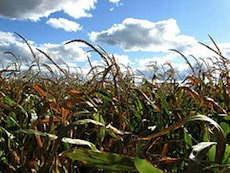Drought tolerant GM corn will not feed the world
Friday, 13 May 2011
GeneWatch, 12 May 2011
http://genewatch.org/article.shtml?als[cid]=567368&als[itemid]=568412
GeneWatch UK today responded to reports that Monsanto’s new drought tolerant genetically modified (GM) corn (maize) does not perform better than conventional varieties (1). The GM industry has made repeated claims that its crops will be needed to feed a growing population as the climate changes, in order to gain public and political support (2).
“This new report highlights the continuing failure of GM to deliver complex traits such as tolerance to drought” said Dr Helen Wallace, Director of GeneWatch UK “The GM industry must now stop its cynical attempts to manipulate the public into believing that GM crops are needed to feed the world”.
Monsanto’s rivals DuPont and Syngenta both announced new drought tolerant corn varieties earlier this year (2). Both varieties were conventionally bred and did not use genetic engineering. Indigenous non-GM drought-tolerant crop varieties are also readily available (3).
New GM traits, including drought-tolerant, salt-tolerant and nitrogen fixing crops, were first promised thirty years ago, when the US government first decided to invest taxpayers’ money in biotechnology research and development (4). However, only two GM traits, herbicide-tolerance and insect resistance (Bt crops), have been commercialised on a significant scale to date. Major problems are now occurring in the US and South America, where most GM herbicide-tolerant soya is grown for animal feed, as herbicide-tolerant superweeds spread across farmland (5). Pest resistance is also beginning to develop where the main developing country crop Bt cotton is grown, and infestations of new pests are also an increasing problem (6).
“GM crops are not sustainable” said Dr Wallace, “Developing weed and pest resistance can lock farmers into a vicious cycle where they are forced to pay for seed price hikes and increasingly expensive chemicals as their GM crops begin to fail”.
Patents on GM seeds mean that farmers cannot save them and have to buy new seeds each year.
Most GM corn (maize) and soya is used as animal feed or subsidised by the US Government for use in industrial-scale biofuels. The increasing consumption of grain-fed meat and use of land and food crops for biofuels are both thought to be factors in driving global hunger.
For further information contact:
Dr Helen Wallace: 01298-24300 (office): 07903-311584 (mobile).

